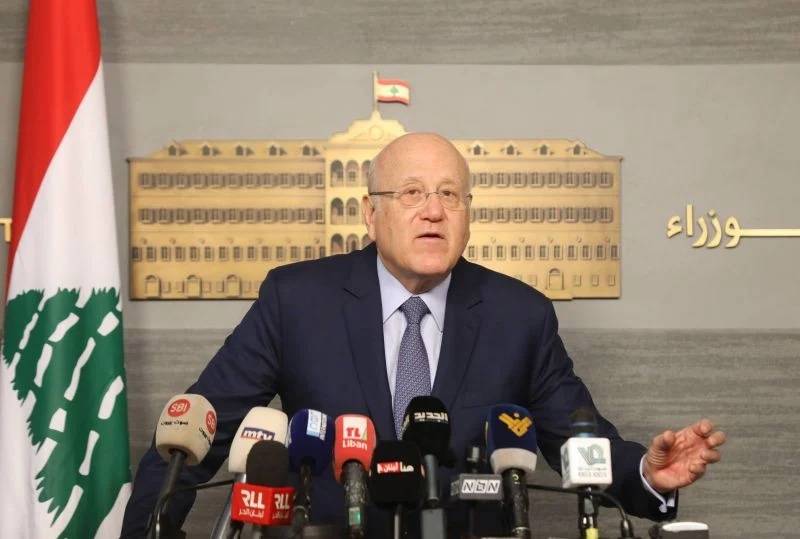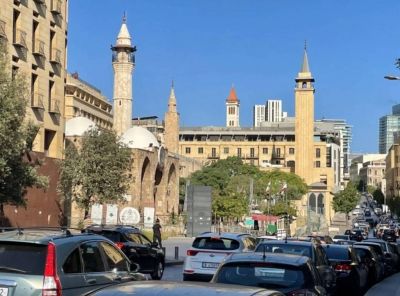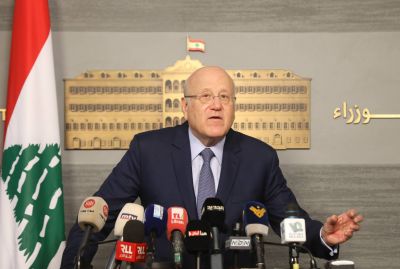
Caretaker Prime Minister Nagib Mikati during his press conference after cabinet meeting on Sept. 12, 2023. (Credit: Dalati & Nohra)
Najib Mikati’s caretaker government approved the draft budget for 2024 with unusual expedience at a cabinet meeting at the Grand Serail on Tuesday. The executive had only begun examining the preliminary draft last Thursday after the Finance Ministry submitted it at the end of August.
In a statement to the press upon his arrival at the Grand Serail, caretaker Finance Minister Youssef Khalil set the tone by asserting that the government planned to complete its examination of the text within two days at most. Tuesday’s meeting also appears to have been scheduled within the foregoing 24 hours to make up for time lost following the cancellation of Monday's meeting, which was unable to take place due to a lack of quorum.
Speaking after the meeting, the prime minister hailed “the first draft budget adopted within the constitutional timeframe by the government,” describing it as a “great achievement” and a “first since 2002.” He added that the text would be transmitted “at the end of the week” to Parliament, which would vote on it during the next ordinary autumn session, in the second half of October.
Reassure the IMF
Mikati also indicated that "ministerial committees will be formed" to finalize draft laws introducing reforms, citing the restructuring of the banking sector. He also called on Parliament to step up its efforts to adapt and vote on the texts it has already received, such as the capital control bill and the amendment to the law abolishing banking secrecy. The public deficit in the draft budget for 2024 has been lowered from its previous level, he added.
These announcements seem as much intended to inform public opinion as to send reassuring signals to the delegation from the International Monetary Fund (IMF), which arrived in Beirut on Monday to tour Lebanon with local officials, a month ahead of its annual autumn meetings with the World Bank.
The restoration of a normal public finance cycle, the reduction of state deficits and the adoption of several key pieces of legislation, including those mentioned above, are among the reforms insisted upon by the IMF, with whom Lebanon has been in talks since 2020 in the hope of obtaining financial aid to help it chart a way out of the crisis into which it has been sinking since 2019. Lebanese leaders have yet to make a breakthrough sufficiently decisive to convince the Fund.
According to Mikati, the IMF delegation he met on Monday at the Grand Serail “advised that public revenues should be collected in Lebanese lira,” whereas the last two draft budgets call for certain taxes to be collected in foreign currencies.
Finally, the prime minister reiterated that “the election of a president [remains] the priority” for Parliament after an almost 11 months of president vacuum since Michel Aoun’s term in office ended on Oct. 31. He also promised to present a report on Syrian migrants to the ministers at the next cabinet meeting. On Monday, the Mikati cabinet adopted a series of measures aimed at drastically limiting the entry and movement of Syrians illegally present on Lebanese territory and made plans to send a delegation to Damascus to discuss the issue.
The VAT rate question
The 2024 draft budget has not escaped criticism. Some Lebanese experts accuse it of seeking to increase tax revenues to balance the books without offering anything in return to the taxpayer. In addition, the government introduced a highly controversial provision in the draft 2023 budget that exempts Lebanese residents from tax on their foreign income earned before 2022, thereby implementing a tax amnesty. According to one government minister, who spoke to L’Orient-Le Jour but asked not to be identified, this provision should be maintained but modified.
On Monday, doubts remained as to whether Article 20, which would raise VAT by one point to 12 percent, would be maintained, after the caretaker Public Works Minister Ali Hamieh, declared that the government was abandoning it. The caretaker Information Minister Ziad Makary, however, made no such announcement during his press briefing following the afternoon meeting. According to a government source who wished to remain anonymous, VAT will remain at 11 percent and this will be reflected in the final version of the draft budget, which the Finance Ministry will finalize before sending it to Parliament.
The deficit forecast in the preliminary draft budget for 2024 amounts to over LL41.7 trillion, or $488.1 million at the Sayrafa platform rate (i.e., LL85,500 to the dollar — the parallel market rate stands between LL89,500 and LL90,000 to the dollar). It is also equivalent to 13.8 percent of public spending. In comparison, the deficit forecast in the 2023 draft budget, which the cabinet approved over the summer, amounted to 24 percent of public spending.
The 2024 draft budget does not, however, specify how the government intends to finance this deficit, given that the country has been in default on its dollar-denominated debt since March 2020 and is still unable to borrow on the markets. The question is all the more pertinent given that the acting governor of Banque du Liban (BDL), Wassim Manssouri, has repeatedly stated that the institution will not finance government spending as it did for years under his predecessor, Riad Salameh, whose term ended on July 31.
The process of adopting the 2024 budget has so far followed the timetable laid down in the Lebanese Constitution and law – a first in years. The 2023 budget, on the other hand, was approved well behind schedule. At this stage, Parliament could decide to vote on both budgets during the same meeting in the ordinary fall session, which starts in October, or to skip the this year’s budget altogether, as happened, for example, in 2021. At a press conference in Parliament on Tuesday, MP Ghada Aoun (Lebanese Forces) said she felt Parliament should opt for the second course of action.

